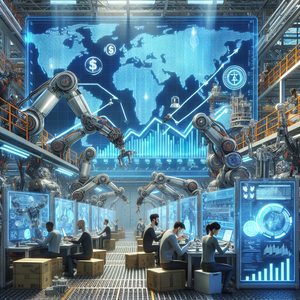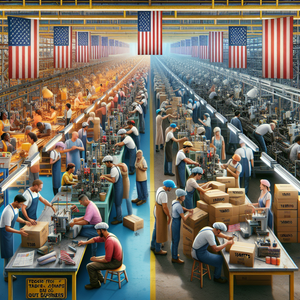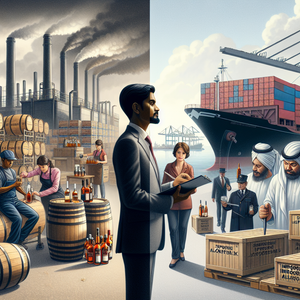
Navigating the Ripple Effects of Tariffs: How Trade Policies Are Reshaping Tech Jobs
The global tech industry is deeply intertwined with international trade, and tariffs have emerged as a powerful force influencing its trajectory. These trade policies, aimed at protecting domestic industries or addressing geopolitical tensions, carry far-reaching consequences. From reshuffling supply chains to driving up production costs, tariffs are redefining the roles and responsibilities of tech professionals across hardware engineering, supply chain management, artificial intelligence (AI), and beyond.
Job Summaries:
Supply Chain Analyst:
- Supply chain analysts are at the forefront of mitigating disruptions caused by tariffs.
- These professionals sift through global data to identify alternative suppliers.
- They devise cost-saving sourcing strategies.
- They ensure compliance with evolving trade laws.
- As tariffs inflate prices and disrupt hardware availability, supply chain analysts have become indispensable in keeping operations efficient.
Trade Compliance Specialist:
- Trade compliance specialists ensure that organizations align with international trade policies, managing customs documentation and monitoring tariff regulations.
- Their expertise minimizes the risk of costly penalties and delays.
- As tariffs become more intricate, trade compliance specialists are increasingly sought after by tech companies looking to avoid legal and logistical hurdles in global trade.
Procurement Manager:
- Procurement managers oversee sourcing strategies, helping companies navigate the rising costs of materials caused by tariffs.
- They collaborate with legal and compliance teams, negotiate supplier contracts, and secure alternative sourcing options to maintain profitability.
- With hardware costs on the rise, procurement managers are pivotal in ensuring financial sustainability and preventing supply chain bottlenecks.
AI Specialist:
- AI specialists are tasked with developing cutting-edge technologies.
- Tariffs on hardware components like AI servers have introduced new challenges.
- Rising costs and limited access to critical resources force these professionals to innovate within stringent constraints.
- Tariffs have slowed hiring in AI-related fields.
- Companies still value specialists who can find creative solutions to hardware shortages and cost limitations.
IT Hardware Engineer:
- IT hardware engineers design and maintain hardware systems, a role made more complex by tariff-induced price hikes and material shortages.
- These engineers often collaborate with procurement teams to source alternative components and adapt designs to maintain production schedules.
- The need for engineers to balance technical innovation with practical constraints has cemented their importance in the evolving tech landscape.
Software Developer:
- While software developers are less directly affected by tariffs, the downstream effects of hardware shortages and increased costs often disrupt development timelines.
- Developers are now tasked with optimizing current systems to reduce reliance on expensive or unavailable hardware.
- As reshoring and cost-saving measures gain traction, developers are being called upon to design efficient, scalable solutions tailored to new supply chain realities.
Data Analyst – Trade Impact:
- These specialized data analysts evaluate the financial and operational effects of tariffs on businesses, providing actionable insights that drive strategic decisions.
- Proficiency in tools like Tableau and Python is essential.
- The increasing complexity of trade policies has elevated the demand for data analysts who can assess risks and recommend adaptive strategies.
Freelance Web Designer:
- Freelance web designers operate outside the direct influence of tariffs, but broader economic uncertainties may lead to increased competition for projects.
- To remain competitive, freelancers must focus on providing affordable, high-value services.
- Although the direct effects are minimal, freelancers may need to adjust their pricing and marketing strategies to adapt to a more competitive landscape.
Customs Broker:
- Customs brokers simplify international trade by handling documentation, calculating duties, and ensuring compliance with trade regulations.
- Their expertise is vital for companies navigating tariff-heavy markets.
- With tariffs creating additional complexities, customs brokers play an essential role in ensuring smooth cross-border transactions.
Global Trade Analyst:
- Global trade analysts assess trends in international trade and advise businesses on how to mitigate risks or explore new opportunities.
- Their insights shape strategies for navigating tariff challenges.
- Companies increasingly rely on trade analysts to identify markets with favorable trade conditions and reduce dependency on tariffed goods.
Manufacturing Engineer:
- Manufacturing engineers optimize production processes.
- Often redesign workflows to cope with higher material costs or shortages caused by tariffs.
- Their ability to adapt manufacturing strategies under pressure has made them invaluable in maintaining operational efficiency despite trade disruptions.
Outsourcing Coordinator:
- Outsourcing coordinators manage vendor relationships, ensuring cost-effectiveness even as tariffs drive up outsourcing expenses.
- Rising costs have pushed coordinators to renegotiate contracts and identify new, affordable outsourcing solutions.
IT Support Specialist:
- IT support specialists ensure minimal operational disruption caused by hardware shortages or delays linked to tariffs.
- Their role is crucial in maintaining business continuity.
- The growing reliance on support teams during resource constraints has amplified the importance of this role.
Economic Policy Analyst:
- Economic policy analysts study how tariffs influence industries like tech and provide insights to policymakers and business leaders.
- Their research helps businesses and governments anticipate and adapt to the economic ripple effects of trade policies.
Technical Sales Specialist:
- Technical sales specialists must address tariff-driven price increases by emphasizing the value of their products and negotiating competitively.
- As product pricing becomes more volatile, skilled sales specialists are crucial in retaining customer loyalty and securing revenue streams.
Tariffs have introduced a new era of complexity to the global tech workforce, creating both challenges and opportunities. Roles in supply chain management, compliance, and trade analysis are becoming more critical, while traditional roles like software development and engineering are adapting to new constraints. Professionals who embrace these changes and develop skills in cost optimization, trade compliance, and global market analysis will position themselves for success in this transformed landscape. Whether you’re a seasoned AI specialist or an aspiring supply chain analyst, the ripple effects of tariffs demand adaptability and innovation. By staying informed and proactive, you can thrive in a tech industry reshaped by global trade dynamics.
Explore More Jobs

